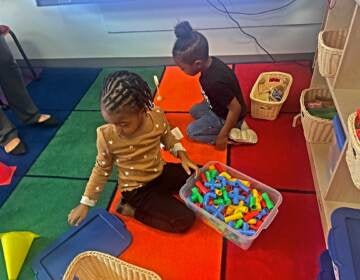Mandarin magic in Delaware K-5 classrooms
Foreign language has been a staple of high school education for years, but in Delaware, more than 1,000 Delaware elementary students spend half their day learning in Chinese.
Listen 5:09Fifth-grader Eve Sabanayagam’s favorite color is blue. She’s delighted tell you that in flawless Chinese as well as English.
Her younger brother Nate thinks red is pretty and he can say that fluently in both languages.
The siblings attend Frear Elementary School near Dover and participate in an ever-expanding experiment in Delaware elementary schools: Chinese language immersion.
Begun six years ago with a handful of kindergartners, today 1,000 Delaware kindergarten through fifth graders are enrolled.
Delaware also has Spanish immersion, with 4,000 kids enrolled. Thirty-two of Delaware’s 110 public elementary schools now have immersion programs.
They learn math, science and other subjects in Mandarin for half of their day, then work in English the other half, said Gregory Fulkerson, director of language acquisition at the state Department of Education.
“We really looked at the research that was a part of a lot of music research,’’ Fulkerson said. “And the idea that you need daily exposure to both languages in order to really gain proficiency in the languages, especially if that language is not the language that you might speak at home.
“It guarantees that they have at least half of their day immersed in Chinese to give them the language practice and opportunities that they need.”
Globally competitive
The immersion program was the brainchild of former Gov. Jack Markell. The goal is to broaden the education of Delaware students but also to make them more attractive to colleges, more competitive in the workplace and help the state attract more employers in the global economy.
Markell decided to start language immersion after a company with call centers in Wilmington and Brussels expanded in Belgium instead of here. That’s because Belgian workers spoke three languages but Delawareans only spoke one.
So Markell went to Utah to observe an immersion program. Also on hand were five Chinese governors who also watched kindergartners speaking in Mandarin.
“They were very impressive and I knew these Chinese governors were thinking, ‘If we’re going to do something, we’re going to do something in Utah.’” Markell said. “And I wanted to put Delaware in that position.”
Mandarin magic in classroom
Six schools schools offer Chinese, led by Frear, where 200 of the 750 students are enrolled.
Walking through Frear, you see Chinese alphabet characters everywhere. Display cases are dedicated to immersion and Chinese culture.
Frear Principal Julie Lavender said the staff goes overboard to promote the program and recognize the participants.
“We did a Chinese New Year gala in the years past,’’ Lavender said. “We do morning announcements once a week where we highlight the Chinese immersion program students and they speak in Chinese on the morning announcements — word of the day, phrases, that sort of thing.
“We have a motto which is One Team, One Goal, No Limits and that is translated as well.”
The kids even Skype with dual-language peers in China. But the real magic takes place in classrooms like Xiwen Li’s at Frear.
She only speaks Chinese to her third-graders, and they must as well. Li says her work is rewarding but challenging. Her students have been taking Chinese for three years, but she has to introduce new concepts the kids haven’t yet learned in their native tongue.
“I taught 3rd grade last year and this year as well and in math our first concept is multiplication and they were never exposed to those concepts before,” Li said. “So for me I always have to teach the vocabulary first. Otherwise they will not be understanding what I’m saying.”
Li also has to remind herself that the children are, after all, 8 years old.
“They are kids so their attention span is very short,’’ she said. “So if they zone out they will definitely be lost because they will not catch up with what I’m saying. So I have to use a lot of the visual aids and to use all of my enthusiasm to get their attention.”
After class with Li, the children are with her English-speaking partner, Lauren Bailey.
“We have to be on the same page all the time,’’ Bailey said. “I need to know what she’s doing over here so I can figure out how to best support her on the other side. Sometimes they might not understand all the concepts all the way in Chinese.
“We’ve been together for four years now so at this point we know each other really well, so we’re able to kind of, you know, we can finish each other’s sentence sometimes.”
Bailey’s role is critical in preparing the kids for statewide proficiency tests, which are in English.
“They need to know what multiplication is in Chinese but they often need to understand what multiplication is in English,’’ Bailey said.
‘The most rewarding experience’
At Downes Elementary in Newark, teacher Pamela Chang is in her first year with immersion after teaching older kids Chinese as a foreign language for a decade.
Chang took the job because in part to see if English-speaking kids that young can really learn in Mandarin. “I wanted to see if it was really, really possible, but I was just so amazed at how much students can do,’’ Chang said.
“They have no problem using Chinese to learn math, to learn science and social studies. And they have no problem explaining the concept in the Chinese language and to me it’s just the most rewarding experience I’ve ever had. When they go outside the school they are going to have tremendous opportunities just waiting for them.”
The program will expand next year into middle school.
At Downes, Principal Patricia Prettyman said she hopes her students stay on their immersion path.
“That’s always the question, that parents may decide on other options, but our hope is that most of them will want to continue with the program,’’ Prettyman said.
And she’ll keep recruiting new kindergartners, mostly through tours for parents.
“They actually watch the children in action. We take them to the kindergarten classrooms,” Prettyman said. “They are blown away when they see within the first couple of months of kindergarten what those little ones are able to do already.”
Markell left office about a year ago but was thrilled to return to Downes with WHYY to witness one of his pet projects in blossom.
“I think a lot of people were wondering early on whether this would make any sense,” Markell said. “But when you see so many families embrace the opportunity for their kids to speak another language it’s really been gratifying.”
WHYY is your source for fact-based, in-depth journalism and information. As a nonprofit organization, we rely on financial support from readers like you. Please give today.





